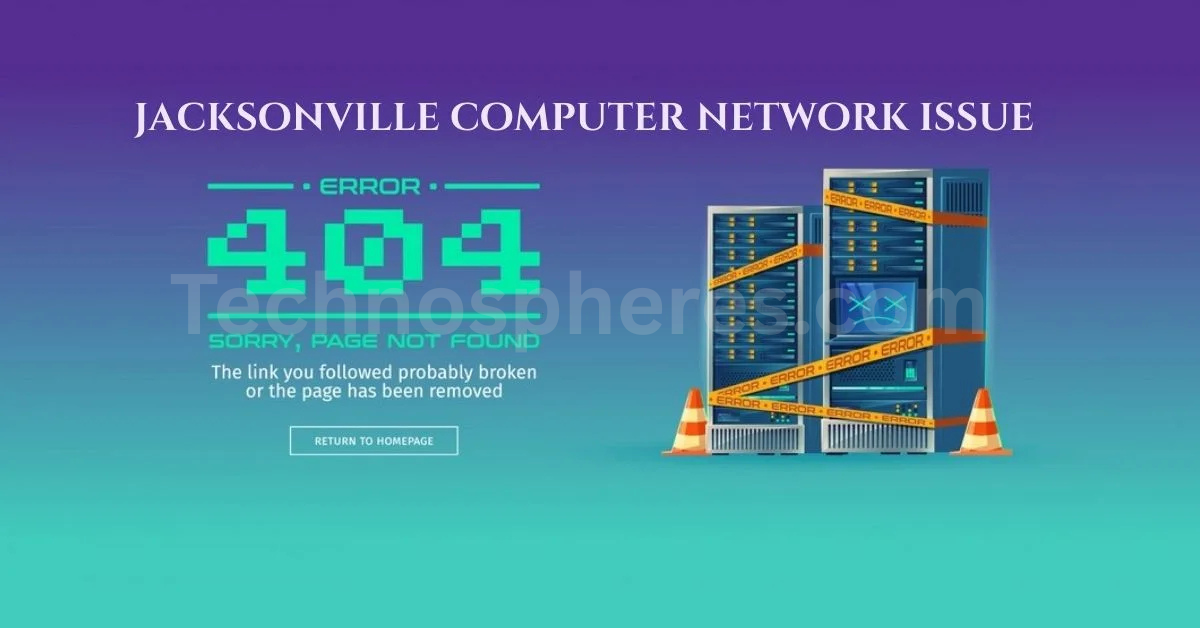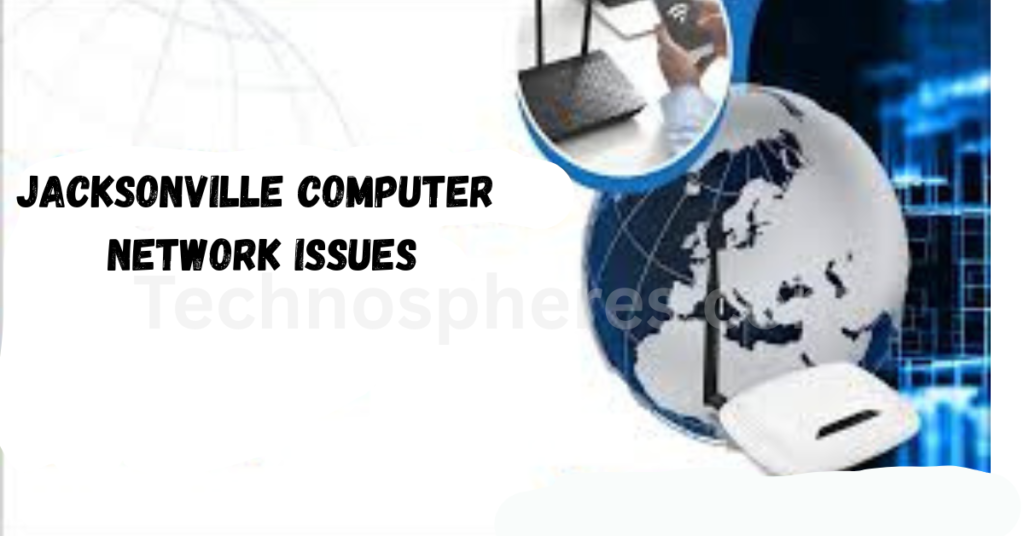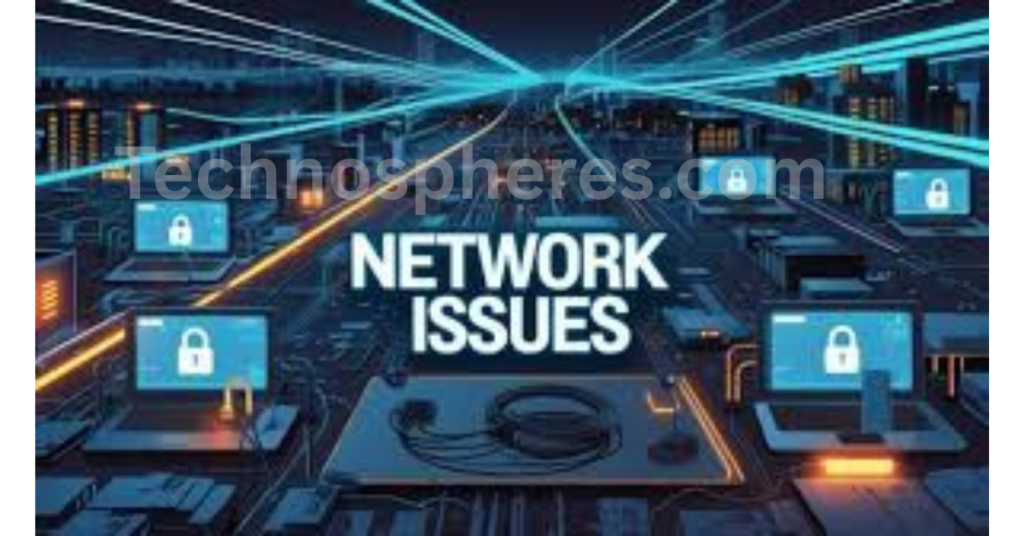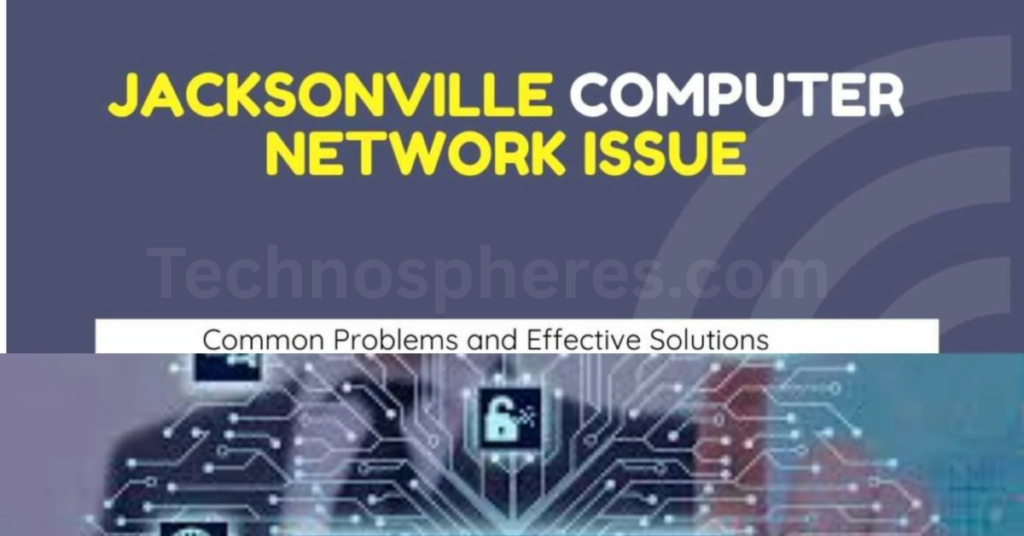
Jacksonville Computer Network Issues
Behind every great leader is a powerful team; behind every small success is great effort. Quick leaders develop in circumstances of great stress; atrocious conditions can sometimes lead to slow managers. Jacksonville Computer Network Issues are obstacles in building its digital infrastructure, the present state of its network systems, and why these developments are critical for the city’s future.
Throughout the 21st century, cities everywhere are turning into intelligent, connected ecosystems. Digital infrastructure—that is, all the digital systems and services supporting connectivity, data processing, and communication—is the crux of this change. The computer network—the lifeline that enables information to circulate freely among people, businesses, and government agencies—is at the heart of this framework. The demand for dependable, flexible, and secure networks becomes more important as cities become bigger and more complicated.
Introduction of Jacksonville’s Digital Infrastructure
One of the biggest cities in Florida, Jacksonville Computer Network Issues has been actively upgrading its digital infrastructure in support of public services, economic development, and civic engagement. This foundation consists of:
- Faster, more reliable internet link now covers more of Jacksonville thanks to the city’s development of highspeed fiber optic network coverage.
- Smart Traffic Management Systems: The city uses network connected sensors and AI algorithms to monitor traffic flow in real time, optimizing traffic lights and reducing congestion.
- Jacksonville gives free public Wi-Fi in important city locations, parks, and libraries to support digital inclusion and help people to stay connected on the go.
- Jacksonville has several data centers delivering public and corporate clients cloud storage, backup, and cybersecurity services. These resources underpin vital activities within industries including finance, logistics, and healthcare.
- Redundant communication systems for first responders and emergency services have been put in place by the city to guarantee quick response times during catastrophes.
- Jacksonville is getting ready for future challenges and possibilities in the era of smart urbanism by means of these digital tools and systems by means of these digital tools and systems.
Significance of Dependable Computer Networks in Present Cities
The working of every up to date city depends on stable computer networks. There are several reasons:
- Effective Public Services: City services rely on continuous network access, from controlling traffic lights to handling utility bills. Every free time might interfere with much needed services impacting thousands of individuals.
- Public Safety and Emergency Response: Police, fire departments use networked communication tools to coordinate fast and efficient responses. A resilient and secure network guarantees that vital information is passed instantly.
- Economic Growth: From communication to ecommerce, companies depend on fast internet and cloud connection for daily operations. Startup firms, technology companies, and investors are drawn by a robust network core.
- Internet access is needed for stable connectivity for telehealth services, electronic medical records, and remote learning platforms. By connecting communities, networks assist to close access and quality disparities.
- Smart City Innovations rely on the Internet of Things (IoT), which in turn depends on constant, highspeed networking.
- Resilience and Cybersecurity: Current risks range from system failures to ransomware assaults. Strong security policies and redundancy help reduce weaknesses in dependable systems.
Slow Internet Standard
Outline:
Sluggish internet is among Jacksonville’s most typical network grievances. Partially local infrastructure restrictions, ISP throttling, or peak hour network congestion could cause this.
Jacksonville Computer Network Issues Context Causes:
- ISP limitations: Some areas may have only a handful of internet service providers, therefore restricting quality and competition.
- Areas with obsolete copper wire infrastructure (DSL) have lower speeds than fiberoptic networks.
- In densely inhabited regions or apartment blocks, several people using shared bandwidth slows down links considerably.
IMPACT:
Particularly vital in a developing tech industry like Jacksonville is slow speeds impacting everything from video streaming to output of remote work and gaming.
Regularly interrupted internet connection
From general to specific ideas:
Intermittent disconnections or complete loss of internet access disturb equally one’s professional and domestic life.
Common origins:
- Jacksonville’s subtropical weather, with regular storms and hurricanes, may affect aboveground cabling and disrupt wireless signals.
- Large residences or constructions with many walls and floors can degrade Wi-Fi signal strength by several orders of magnitude.
- Routers and modems given by ISPs might be old or incorrectly set.

Poor network connectivity
Developed from:
Entire portions of a house or building can suffer from network “dead zones” or poor Wi-Fi signals.
Factors that give towards:
- Big Homes and Structures: Because many suburban Jacksonville homes are large or multistory, Wi-Fi coverage can be patchy.
- Routers placed inside closets, near microwaves, or in a corner lose their good coverage.
- No Network Extenders: Standard routers can’t deliver uninterrupted coverage over much as lacking boosters or mesh networks.
Resolutions:
In sprawling residential and commercial areas, mesh Wi-Fi systems or access points on enterprise level might help to improve coverage.
Defective hardware and obsolete equipment
Old or broken network gear can seriously restrict performance or even lead to failures.
Problems observed in Jacksonville:
- Many small firms and homeowners still use the same networking equipment for five or more years with no firmware upgrades.
- Jacksonville’s heat and humidity could over time harm hardware unless it is well ventilated or protected, therefore causing environmental damage.
- Lack of Preventive Management: Equipment quietly fails without periodic inspections, hence performance degrades or the machine crashes utterly.
Tip:
Keeping firmware current and regularly replacing every three to five years will avoid many of these problems.
Cybersecurity Risks and Exposure
Particularly given the increase in telecommuting and smart devices in houses and offices, cybersecurity is becoming more important.
Local risk factors:
- Small firms in Jacksonville, particularly in health care, retail, and financial sector, are often victims of phishing and malware assaults.
- Unsecured networks: Default router accounts are used in many residences and even little companies, therefore unauthorized access is possible.
- Absence of network segmentation: Devices including IoT thermostats, security cameras, and smart televisions frequently share the same network as sensitive corporate systems, creating security problem.
root causes of Jacksonville Computer Network Issues
Many times ignored until they cause major problems, network problems can result from different origins. Knowing these underlying conditions enables companies and IT departments to implement preventive policies and plan for long term dependability.
Outdated infrastructure
Network equipment and software fall obsolete over time. Performance problems and weaknesses might result from older infrastructure not supporting the most recent security measures or technologies. Usually found aging ingredients are:
- Outdated switches and routers
- Obsolete software.
- Frayed cables and connectors
- Already installed systems not compatible with current uses.
- Lower network speed and stability result from deteriorating parts, which cause regular downtime or lower productivity.

Limitations for service purveyors
External service providers may still be a bottleneck notwithstanding strong inner networks. Those from the ISP—including slow bandwidth, high latency, regular outages, or oversubscribed networks—greatly affect internet performance. In addition, little companies could not have the customer support or the resources to address issues promptly.
Effects of climate and habitat
Factors including storms, humidity, or high temperature can upset physical network elements. Generalizing, for verse:
- Lightning could damage exposed wires or produce power surges.
- Underground cables could be swamped by heavy rain.
- Heat can damage or overtax fragile equipment.
- These circumstances are particularly challenging in areas subject to severe weather; without adequate precautions, network reliability is constantly in danger.
Small firms lack IT help.
Little or none solitary IT staff is dedicated in many small enterprises. In consequence:
- Network problems linger for extended periods.
- Routine maintenance and upgrades are sometimes missed.
- Little strategic planning exists for either network scalability or cyber security here.
- This results in a reactive response, where issues are only tackled after causing substantial damage rather than being proactively avoided.
Comparison of Old vs. Modern Network Equipment
| Feature | Aging Equipment | Modern Equipment |
| Speed | 100 Mbps or less | 1 Gbps to 10+ Gbps |
| Security Support | Limited or outdated | Advanced encryption, firewall integration |
| Compatibility | Often incompatible | Designed for modern systems |
| Maintenance Frequency | High | Low |
| Energy Efficiency | Low | High |
Impact on regional industries and farms
Network issues can greatly affect the performance of several Jacksonville industries. These sectors are impacted differently:
Corporate operations and businesses
Everyday company activities depend on stable internet access, but:
- Point of sale (POS) solutions
- Online transactions are
- Fax, Voice, Videoconferencing, Email: Communication and collaborative tools
- Lost revenue, lower client satisfaction, and service delivery delays is what network outages cause.
Educational Organizations
Stable networks are absolutely vital for universities and schools for:
- Online educational websites
- Student grades and grading systems
- Virtual classes and mixed mode learning
- Connectivity problems cause breaks in the learning process, missed deadlines, and decreased involvement among staff and pupils.
Medical professionals
Good internet is absolutely essential in healthcare for:
- Electronically obtaining health records (EHR)
- Modern Technologies make it possible for remote consultations.
- Watching of patients remotely
- Department and facility coordination
- Patient care might suffer, diagnosis may be delayed, and emergency response could be impeded by downtime.
Home users and remote workers
Strong and consistent internet is now a household need since remote employment and online classes are becoming more popular. Network issues here might give rise to:
- Missed meetings or deadlines.
- Disturbed streaming or game session’s
- Lack of access to VPNs or cloud solutions
- Particularly in homes with many users, this can damage performance and cause irritability.
The Jacksonville based ISPs
Several large and small internet service providers operate in Jacksonville, serving both commercial and residential clients with a variety of products.
- Major ISPs reviewed (for example Comcast, AT&T, etc.)
- Among the better known Internet service providers in Jacksonville are:
- Comcast Xfinity gives both bundled options and cable internet.
- AT&T presents DSL and fiber alternatives in particular market.
- Spectrum is famous for their lack of data limits and fast internet.
- T Mobile House Internet: A 5G wireless option.
- Vyve Broadband operates across some of Florida.
Comparison of Services, Reliability, and Customer Support
| ISP | Speed Options | Reliability (Avg. Uptime) | Customer Support Rating | Data Caps |
| Comcast Xfinity | Up to 1200 Mbps | 99.9% | ★★★☆☆ | 1.2 TB/month |
| AT&T Fiber | Up to 5000 Mbps | 99.9% | ★★★★☆ | None |
| Spectrum | Up to 1000 Mbps | 99.8% | ★★★☆☆ | None |
| T-Mobile 5G Home | Up to 245 Mbps | 99.7% | ★★★★☆ | None |
| Vyve Broadband | Up to 960 Mbps | 99.6% | ★★☆☆☆ | 1 TB/month |
Lessons and Local Cases
Real-life examples and experiences throw light on the importance of the reliability of the network. Here are some of the focus areas.
Most Noteworthy Outages in Past 5 Years
These would be during the past five years when Jacksonville witnessed major internet disruptions, such as:
- Comcast Xfinity Outage (2021)- An accidental cutting of a major fiber line during road construction has caused a massive blackout for nearly 12 hours over Jacksonville and neighboring areas.
- Hurricane Ian impact (2022): Hurricane Ian knocked out power and internet services in parts of Florida, including Jacksonville. Most ISPs faced a herculean task in trying to restore services because of flooding and destroyed infrastructure.
- AT&T Fiber failure (2023): An internal systems failure has resulted in intermittent service for fiber users, affecting streaming, video conferencing, and VPN accessibility for remote workers.
- Disruptions as highlighted will imply business, education, and emergency services.
Interviews with Affect Business Owners and IT Professionals
We had to shut down for nearly a day when the Internet went out. Our POS, inventory systems, and online orders, all rely on it. More than loss in sales, that cost a big chunk of customer trust.
IT Professional-Jackson IT Solutions:
- Most small businesses don’t invest in a backup system. Most of our clients just call after something breaks. If more of them did proactive network management, countless outages wouldn’t be as awful, if even happening.
- This is very much what relates to the planning and resilience issues within a generalization of small to midsize enterprises.
Troubleshooting & Solutions
Proactive troubleshooting and routine maintenance reduce the chances of having network problems. Here is how users and organizations can be proactive:
Home and Office Network Troubleshooting Tips for the Basic
For everyday users, few simple steps can quickly get them out of common issues: Restart the Router/Modem – this solves most temporary connectivity issues.
- Check for Loose Cables or Connections – most physical disconnections don’t get noticed easily.
- Execute Speed Tests – helps capture bandwidth problems, possibly ISP-related.
- Change to Wired Connection – useful in testing whether it is indeed the Wi-Fi.
- Upgrade the Router Firmware – having old firmware could become a source of instability or vulnerabilities.
- Proved-it-isolated – Test on other devices that may differ on the occurrence of the problems it could define whether the problem is specific to your device or not.
Best Practices for Network Management:
For business and power users, keeping structured access will help ensure network reliability:
- Segment your networks, keeping guest Wi-Fi from internal systems.
- Use enterprise-level equipment- when compared to the consumer grade, businesses are very reliable and secure.
- Monitor network traffic-here tool like NetFlow or Wireshark helps in finding the unusual behaviors.
- Backup plans-redoing tools like cellular failover reduces downtime.
- Implement access controls-it ensures that the network protects against unauthorized users.
Importance of Regular Maintenance and Updates
Routine maintenance is usually not seen as critical yet is very important. This is why:
- It prevents vulnerabilities: Security holes in routers, firewalls, and software are patched by regular updates.
- Boosts performance: improving speed and connectivity can be achieved with firmware upgrades.
- Cuts Downtimes: Scheduled checkups discover problems before they turn into major outages.
- Increase Hardware Life: A clean, cool, and well-updated system helps reduce the stress on hardware.
Technology Trends and Future Outlook
The technology realm in Jacksonville and beyond is changing. Some important currents are connectivity, AI, cloud computing, and edge computing. The future, therefore, may be able to experience blistering speed with further data usage, automation of services, and reliance on smart infrastructure.
Adoption of 5G and Fiber Optics
Jacksonville is increasingly adopting 5G wireless networks and fiber-optic internet, both offer ultra-fast speeds and lower latency. While 5G is crucially important for mobile devices and smart infrastructure, fiber optics bring stability to internet services for homes and businesses.

Smart City Initiatives in Jacksonville
All of these entail the use of technologies to improve services in the city and the overall quality of life. For Jacksonville, this can include smart traffic management, public Wi-Fi, smart lighting, energy efficiency, and connected public transportation.
Year 2021: Integrating Expansion Plans by ISPs and City Planning Agencies
The Internet Service Providers (ISPs) and city planners are working in conjunction toward expanding access to high-speed internet across the City of Jacksonville, especially in the underserved areas. Among other things, this could involve the installation of new fiber lines, construction of 5G towers, or subsidized access for low-income neighborhoods.
Cybersecurity Threats to Networks in Jacksonville
The larger these networks become, the greater the risks. Apart from phishing attempts, Jacksonville is all set for data breaches and ransomware attacks. The sectors most susceptible are also some of the most critical, such as health care, education, or local government.
Inherent Threats and Recent Breaches
Some recent Jacksonville Computer Network Issues have involved ransomware attacks of local agency and breach attempts focusing on small businesses. The most widely used threat vectors are email scams and credential theft as well as exploiting outdated software or poorly secured networks.
Conclusion
This section ties Jacksonville Computer Network Issues everything together, offering a final reflection on Jacksonville’s current network and tech environment. It emphasizes the importance of modern infrastructure, cybersecurity readiness, and collaboration between public and private sectors to ensure a resilient digital future.
Summary of Jacksonville Computer Network Issues
Key challenges highlighted include:
- Unequal internet access across neighborhoods
- Ongoing cybersecurity threats and recent data breaches
- Limited resources for small businesses to manage IT risks
- The need for faster expansion of 5G and fiber-optic networks
- Gaps in community awareness and tech education
- These Jacksonville Computer Network Issues must be addressed to improve Jacksonville’s digital landscape.
Frequently Asked Questions
How do I handle my internet disconnections in Jacksonville?
Reboot the modem and router first. Check cable connections and make sure devices are updated. If problems persist, conduct a speed test to see how your actual speed measures up to what your plan promises. You should also check with your provider about any local outages. If everything seems okay, call your ISP to troubleshoot or request a technician visit.
Which is the best ISP among all in Jacksonville?
AT&T Fiber, Xfinity, and T-Mobile 5G Home Internet were the three most reliable ISPs in Jacksonville according to new data. The best reliable speed and up-time will be always suitable in the areas where AT&T fiber services are accessible.
Usually, do outages take place during storms or hurricanes in Jacksonville?
Yes, outages do occur. For instance, in Jacksonville, occasional hurricanes and tropical storms can bring about outages. This could result from infrastructure damage, power loss, or flooding.
What can small businesses do for cheap network security?
Following are a few cheap ideas:
- Have a strong firewall; keep it updated.
- Put in place good antivirus and anti-malware protection.
- Encrypt the Wi-Fi networks (preferably WPA3).
What is the mean Internet speed in Jacksonville with respect to remote employees?
A speed that will be good for most remote work will range somewhere between download speeds on average in this region, which is between 150 Mbps and about 250 Mbps. This varies by the provider and which plan you use.
Read more About Tech trends from Technospheres.



